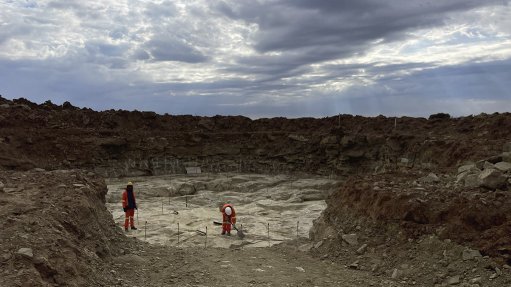
Final cleaning underway on a foundation
Constructing wind energy facilities on mountains presents unique challenges, particularly in terms of accessing the construction sites. The Phezukomoya Wind Energy Facility, situated near Noupoort on the boundary of the Eastern Cape and Northern Cape provinces, faced such challenges during its start of its construction.
Concor, in partnership with Murray & Roberts OptiPower, forms part of the consortium responsible for the Phezukomoya Wind Energy Facility. The consortium was awarded contracts to construct the Koruson Main Transmission Station, as well as two of the three wind farms within the Koruson One development. EDF Renewables (South Africa) and its partners H1 Capital and Gibb Crede is developing Koruson One which was awarded in the Renewable Independent Power Producer Programme (REIPPP) Bid Window 5.
The primary challenge encountered by Concor, who is responsible for the civil balance of plant on this project, was establishing access routes to the mountaintops where the wind turbine foundations and hardstands are being constructed.
Marritus Bezuidenhout, Project Manager at Concor, says establishing access was not straightforward as the rocky and difficult terrain required extensive blasting and clearing work before access routes could be constructed to reach the foundation positions.
To date, Concor has successfully delivered the civil balance of plant on more than 10 wind farms in the Western, Eastern, and Northern Cape regions, and Bezuidenhout says this experience played a significant role in optimising the construction activities on the Phezukomoya project facilitating preliminary access to some foundation positions while the construction of access roadways continues.
One notable aspect of the Phezukomoya Wind Energy project is the use of hollow foundations, a first for a wind farm in South Africa. Hollow foundations offer several advantages, including a reduced carbon footprint due to the use of less readymix concrete. The hollow design also allows for the inclusion of ducts and facilitates post-tensioning of cables for the tower, and installation of the power cables to the electrical reticulation network.
“However,” Bezuidenhout says, “constructing hollow foundations is more labour intensive, requiring additional formwork as well as more steel reinforcing. It also requires precision work by the steel fixing teams to ensure the stringent tolerances are met.”
Winter temperatures pose another challenge for the construction team. With temperatures often falling below 5°C, the casting of readymix concrete need to be carefully managed. To mitigate this issue, heat pumps are used at the batch plant while strict scheduling and control of concrete casting is implemented. Thermal blankets are also used during the curing process.
In addition to addressing construction challenges, Concor prioritised community engagement and skills development. A significant portion of the project's staff comprises local community members who receive training and on-site experiential work. The company collaborates with local SMMEs (Small, Medium and Micro Enterprises), subcontracting services such as steel fixing, temporary ablution facilities, security, and transportation to the local taxi association.